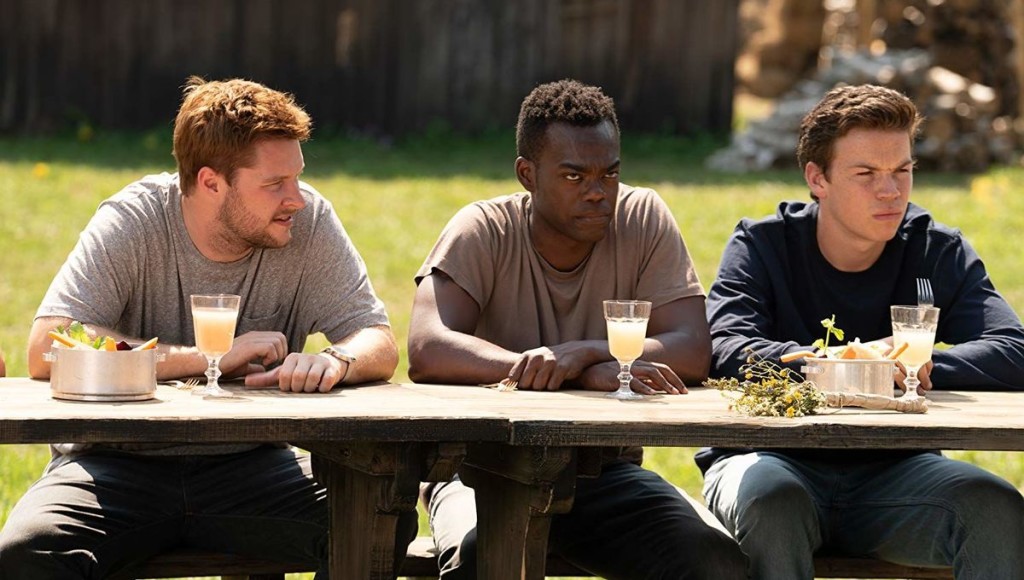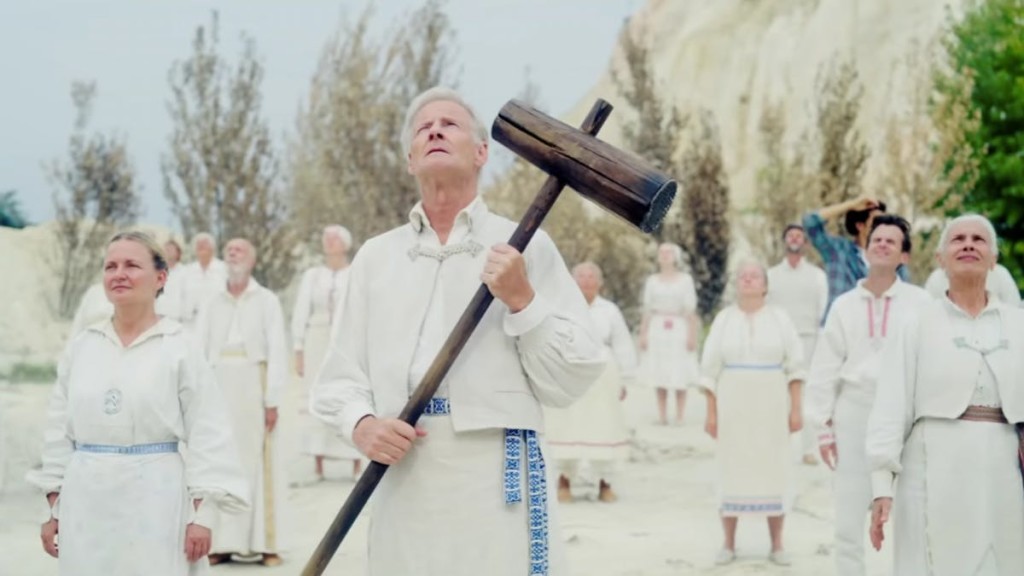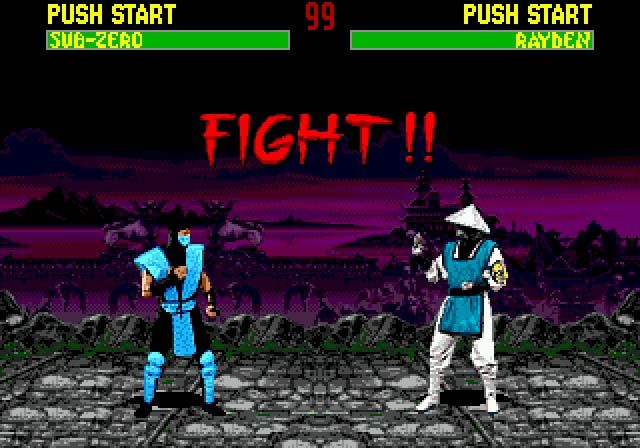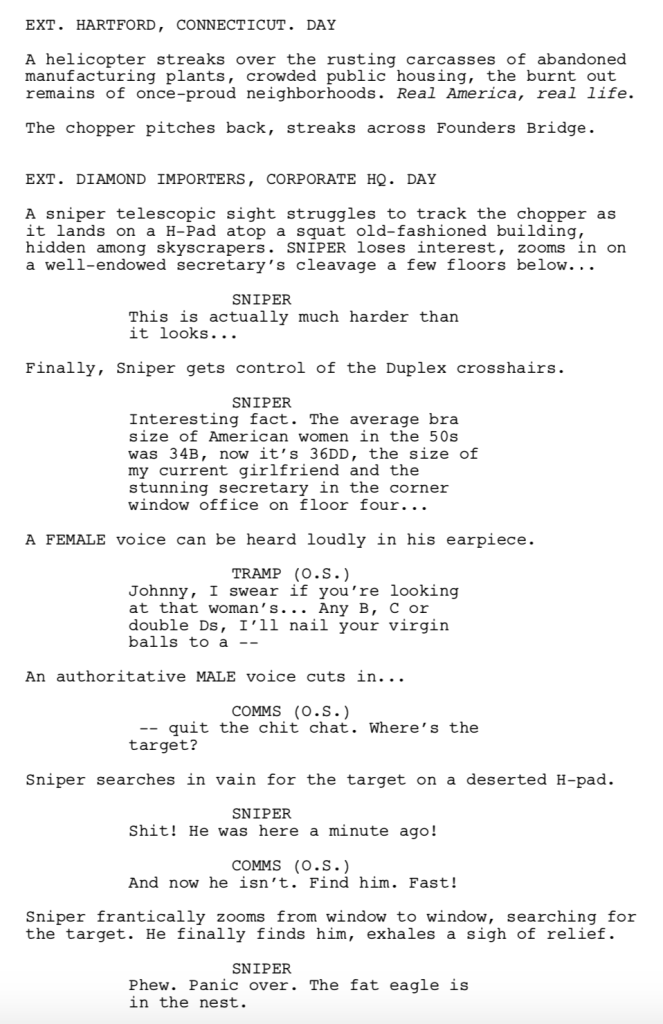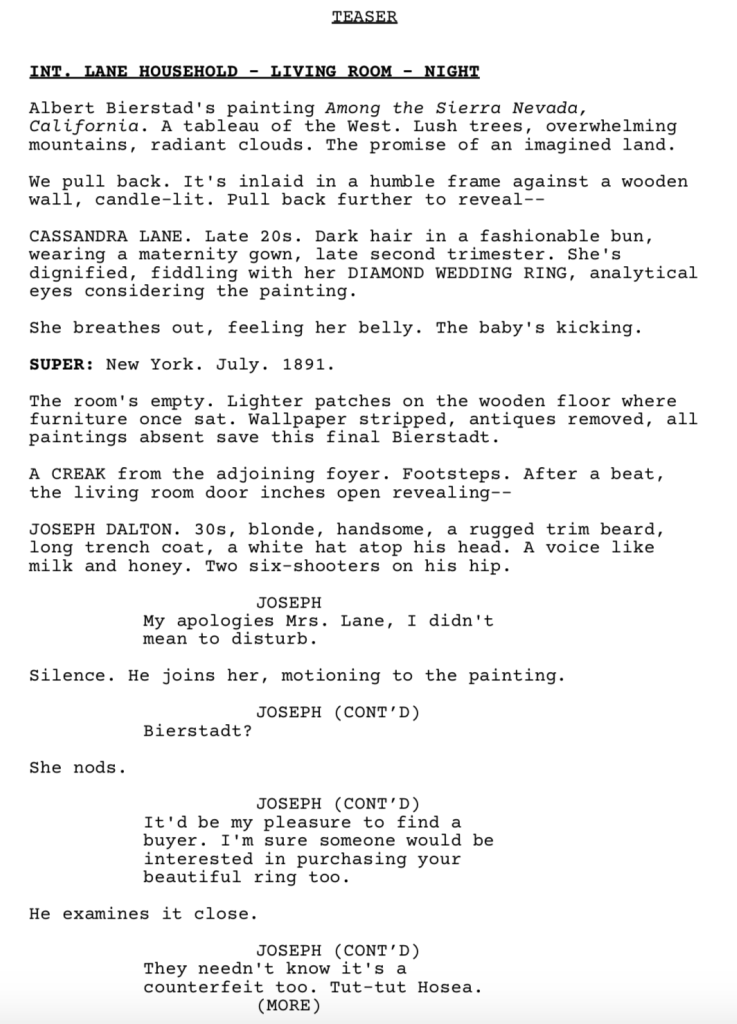By far, one of the biggest mistakes I see amateur writers making is that they’re NOT WRITING MOVIES. They’re writing the screenplay versions of novels. That is to say, the story only works in written form. It isn’t meant to be put up on the screen because there’s nothing cinematic about it.
How do you know if you’re writing a movie? A “movie” – as I’m defining it for today’s article – is a concept based on a pre-existing model that has proven to make money for Hollywood. A submarine flick, for example. Bunch of people in deep waters, usually in war time, dealing with some sort of enemy. That’s a “movie” because you can point to successful templates of the story in the past. Das Boot, U-571, The Hunt for Red October, Crimson Tide.
On the flip side, a screenplay about a former submarine captain who turns his home into an Air B&B so he can go on a road trip across America? Not a movie. And yet I come across a lot of scripts with that kind of DNA. The writers are passionate about the characters and the subject matter. But there’s nothing in the script where you can say, “There were several successful movies with a similar setup.”
The reason I bring this up is because most writers shoot themselves in the foot before they’ve even written their title page. Their idea is faulty because it isn’t a movie. So it doesn’t matter what they write. I know that sounds crazy. But anyone who’s read a lot of screenplays will tell you the same thing. If your concept isn’t a movie, you can rewrite a script a thousand times and nothing’s going to come of it.
To better understand what I’m saying, I’m going to give you five examples of “non-movie” ideas and five examples of “movie” ideas. The great thing about all the mistakes Hollywood has made is that we can use their failures as data. They provide us with valuable information about what works and what doesn’t. Let’s start with five movies that should’ve never been made in the first place.
Lucy in the Sky – Lucy is the Sky is the ultimate embodiment of a non-movie. It’s about a female astronaut who has an out-of-body experience when she’s up on the shuttle, comes home, and has trouble dealing with it. Where’s the comparable movie that tells us this is going to work? There isn’t any. But there’s an even bigger issue at play here, and it seems to be present with all non-movie scripts. Vagueness. The concept lacks focus. You can watch this trailer 20 times and still not know what the movie is about. And that’s something good writers should be able to recognize on the page. There’s no clear concept. There’s no goal. There are no stakes. The time frame is flexible because nothing needs to get done.
The Book of Henry – A cancer-ridden kid dies and leaves the blueprint to a mother and son to murder the bad neighbor next door. This one is a little less clear-cut because you do have some movie-like elements. We have a villain (the bad neighbor who abuses his daughter). And we have people who want to save that girl, giving the story a clear goal. But why do you need a kid dying of cancer to jump-start this story? And where in cinema history does an 8 year old kid help his mother murder someone? There’s no template for that because it’s a nonsensical setup. Which is why people were confused and didn’t go to the movie.
Hologram for a King – Hologram for a King also has some movie-like elements. You’ve got a flawed character going out on a journey to land a big client. This is not the worst setup for a film. But you run into problems when your hero’s goal isn’t relatable. The hero here goes to Saudi Arabia to sell a hologram technology to a king? How are we able to connect with that? It’s too far outside our everyday existence for us to relate to. But the bigger issue is what we’ve been talking about all along. Where’s the comp here? Where is the movie that’s like Hologram for a King that worked? There is none. So they shouldn’t have been surprised when only ten people showed up to the theater.
Aloha – “Aloha” was a trap script. It’s one of these ideas that you can convince yourself is similar to pre-existing templates. There’s a man and a woman, and some comedy. So it’s a romantic comedy right? A small part of it is. But the main focus of the movie is launching a military satellite and placating the local Hawaiian population who doesn’t support the launch. I’ll ask you again. Where is the comparable movie? Can you think of any movie in history that has a satellite launch and local people demonstrating against it? No comp = uncharted waters = a rambling unfocused story = worst box office of that writer-director’s career.
Bad Times at El Royale – Bad Times gets about as close to the line of being a “movie” as a non-movie can get. You’ve got a cinematic location. It’s contained. Things go badly. People die. These are all things you see in movies. But here’s the problem. There was no singular plot element that the movie revolved around. Usually, you write something like Knives Out or Murder on the Orient Express where someone dies and everyone tries to solve the murder. This setup is as classic a setup as there is. And yet Drew Goddard overthought everything and created this zig-zagging haphazard group of characters without any real purpose or plan. It was THIS decision that made this a non-movie. One of the primary ingredients for a movie template is that there be a focused protagonist objective.
Now that we know what a movie isn’t, let’s look at what a movie is. Had any of these scripts fallen on my desk, I would have passed them up to a producer. You may notice that a few of these examples aren’t great movies. That’s the point. When you nail a movie template, you don’t have to nail the execution. The template does most of the work for you.
Suicide Squad – A bunch of bad guys have to team up to achieve an objective together. This template has been around for as long as Sunset Boulevard has been around. We’ve seen it with Con Air, Fast and Furious, The Dirty Dozen, later that year with Rogue One. One of the most powerful things you can have in the back of your script’s pocket is a list of similar films that did great at the box office. Now I already hear some of you saying, “Well I don’t want to write derivative sh*t Carson!” I’m not saying you have to write derivative sh*t. You have to find something that has worked in the past and come up with your own spin on it.
A Star is Born – I included this one because, in a vacuum, it could be argued it’s a non-movie idea. Two people fall in love. Tragedy occurs. That’s just characters going through life. But, remember, it isn’t so much the hook we’re focused on today. We’re focused on PREVIOUS MOVIES that have used a similar template and been successful. Hollywood has been using the tragic love story all the way back since, what? Romeo and Juliet? It’s a formula that works. And it works even better if you can add a large backdrop. Titanic. Casablanca. Here, it’s worldwide fame and success. It gets a little harder if there are no other unique elements in the story, but it can still work (Love Story).
Rocketman and Bohemian Rhapsody – I wouldn’t get caught dead watching one of these movies. They’re not my thing. But as talking points in today’s article, it doesn’t get better than this. Music biopics are a Hollywood staple. It’s one of the sub-genres they know how to market best. They get glitz and glamour, they get entertainment, they get song and dance. That’s their bread and butter. Which is why almost all of these music biopics do well. I didn’t even realize that Rocketman was a few million shy of 100 million. That’s how sneaky successful these things are. And again: It’s about recognizing a template that Hollywood understands. If you send them something they don’t understand? They’re going to say ‘no.’ And yet I see writers banging their heads against the Bel Air gates with obscure movie ideas that nobody in their right mind would make.
The Equalizer – Retired guy with a gun. Hollywood likes anybody with a gun. But they especially like these retired guys with them. It’s interesting from a story perspective (does he still got it?). And it allows studios to find vehicles for actors who have passed the half-century mark. This is the most obvious example of the “template” approach. But don’t let that scare you. There are a million variations of this idea that can be explored.
A Quiet Place – “Family in peril” horror movies. If you put a family (with some fractured components) in a bad situation and they have to stick together to defeat a horrifying enemy, your narrative isn’t going to get any cleaner than that. A lot of people thought “Us” was sort of a weird concept. But why did it work? Because it was a “family in peril” horror movie. And the reality is, most horror concepts work well since horror is the easiest genre to market. But that doesn’t mean you can do anything you want. Stick to the ones that have the best track record. A group of teens (or 20-something) out in a remote area getting stalked by something. A girl or woman gets possessed by something. A group of people get stuck in a scary house. Find slight variations on these templates (like the upcoming “Incident at Fort Bragg,” which follows the only government sanctioned exorcism of a female soldier) and you’ll be in good shape.
Now let me be clear about something. There will always be outliers. Before American Beauty came out, there was no template for something like that working. The Martian was a gamble. La La Land was unique. Wonder was a surprise hit. To a certain degree, Get Out was a risk. Nobody was doing social issues horror before Jordan Peele. So if you truly think you have the outlier script, I’m not going to stop you from writing it. But if you are tired of looking at Hollywood from the outside-in, you may want to start writing scripts based on pre-established successful templates. It doesn’t mean you’re selling out. In fact, a good writer will twist one of these templates just enough that their concept feels original. And if you start writing these template scripts regularly, I guarantee you you’ll break in faster than if you’re writing a bunch of Lucy in the Sky with the Hologram Kings.
Genre: Horror
Premise: (from IMDB) A group of friends travels to Sweden to attend a reclusive mid-summer festival. What begins as an idyllic retreat quickly devolves into an increasingly violent and bizarre competition at the hands of a pagan cult.
About: Writer/Director Ari Aster was anointed to “next big thing” status when his intense not-for-everyone film, Hereditary, became indie studio A24’s biggest movie ever. Aster didn’t waste any time, using the buzz to launch his next project, Midsommar, immediately. The film didn’t perform as well as hoped, making $27 million domestically compared to Hereditary’s $44 million. Still, Aster’s now loyal following loved it, and it’s expected to do very well on digital.
Writer: Ari Aster
Details: 150 minutes!
I resisted seeing this when it came out because it was written and directed by Ari Aster, the writer of the worst screenplay ever, Hereditary.
But conflict lives deep within my heart as I’ve always wanted a great modern day horror film about cults. And while I despised the screenplay for Hereditary, I had to admit its trailer exhibited a talented directing eye. Then Martin Scorsese spent 30 minutes of a recent Q&A talking about how much he loved Hereditary and I finally said, “You know what. I’m going to see if this guy learned anything about screenwriting since his last film,” and popped Midsommar into the old Apple TV.
The premise for the film is a simple one. A 20-something girl, Dani, loses her sister to suicide. Incidentally, the carbon monoxide she used to kill herself also leaked into her parents’ room and killed them too. So Dani is one family down.
Her grad school boyfriend, Christian, is tagging along with his Swedish friend, Pelle, and a couple of other guys, to check out a mid-summer festival in Pelle’s rural Swedish village. Dani decides to join them and off they go.
There’s a strong Heaven’s Gate vibe to the white-clothed hippy community and yet nobody thinks to turn and leave. They can’t, of course, or else there would be no movie.
The people there seem nice (don’t they always), and invite everyone to a ceremony where two elders are brought to an overarching cliff to speak to everyone. Except they don’t say a word. They JUMP! And die. Splat.
In real life, our characters would sprint to the nearest airfield and stow away in the landing gear if it got them away from this psychotic Swedish Manson cult. But no, our characters choose to stay and see what these wily Swedes are up to next. Naturally, these things turn out to be nefarious and one by one, our characters die in awful ways.
Before we get to the script stuff, lots of people were surprised that this film didn’t do as well as Hereditary. Yet the reason is simple: It’s hard to pull horror off in the daylight. You can do it with zombies. But you can’t do it with much else.
The reason horror works so well is because the darkness activates the imagination. It offloads the work from the movie to the viewer. They get to fill in their own fears with what’s in the corner of the dark room, what’s at the bottom of the dark basement stairway, who that shadow belongs to at the end of the dark hallway.
You don’t get any of that with daylight. So you have to find your horror elsewhere, and that can be challenging. So when you see this big bright movie that’s being advertised as a horror film, it’s confusing. And people aren’t going to show up to confusing. They want a good idea of what they’re walking into.
Now from a cinematic perspective, Aster’s choice is exciting. There’s irony in the search for fear in daylight. And outside of some annoying directing choices, Misommar works. That’s because every viewer knows this place is bad news. So as long as you keep a log on the fire for the next looming threat, we’re going to be into it.
Surprisingly, the thing that makes Aster a bad writer also helps him. When your narratives are weak and unfocused, as both this and Hereditary are, it gives the story a natural unpredictability. If you’re not following any common act or scene beats, we’re not going to know what’s coming next. And that’s why I kept watching. I had no idea where this was going.
Aster also put a lot of work into the mythology of this village and it paid off. I trusted that whenever something happened that was tied to this place’s weird rules, it was authentic, because I could tell Aster did his homework. I mean there’s a giant barn where the entire inside is covered in a historic mural of this clan’s history. You can’t make that sort of thing up on the fly. You have to know it and convey it to the art department.
Which is what makes this movie so frustrating. If Aster took some time to learn screenwriting, he would be unstoppable. Cause as a visual storyteller, he’s quite talented.
To give you an idea of what I mean by bad writing, Christian comes up to one of the friends after the two elders kill themselves and tells him he wants to write his thesis paper on this clan. The friend gets mad, replying, “I told you already. I was writing my thesis about this place!” Not only did I have no idea that either of these two were writing theses before this moment. But I didn’t even know they were in school. That’s how poor the writing was. We’d find out major story components after the fact.
There were all sorts of character issues here. Why doesn’t Pelle warn his best friends that they’re about to watch two people kill themselves? Why wouldn’t he brace them for that? Tell them that if it’s too much, they might want to sit the ceremony out? I’ll tell you why. Because if he did, Aster wouldn’t have been able to write the scene.
A bad writer says, “Well I’m just going to do it anyway.” A good writer says, “I have to figure out a believable way in which he wouldn’t tell them.” Why do bad writers always go with the former? Because it’s eaasssssyyyyyieeer!! It’s easier not to do the work! Are you telling me I may have to sit down several hours a day for a few days until I come up with a believable reason for why my character wouldn’t warn his friends about this? Screw that. It’ll take too long!
But I think Aster’s taught me the secret to getting these daytime horror movies right. Just follow two rules. One, be weird. Be really really weird. You don’t have the darkness to hide behind so, instead, have a bunch weird crap happen. This is why Wicker Man is still the champion of this sub-genre. You’d have little kids joyously singing about sex through choreographed dances. Or naked women singing about boning you while banging on the other side of your hotel room wall.
The other tool to use is shock. And this is something Aster is becoming known for. I mean he killed a main family member in his last film by having her stick her head out the window and get it decapitated by a telephone pole. Watching an uninterrupted shot of a woman jumping to her death and her head splattering over a rock in real-time certainly jolted me awake.
Now Aster just needs to figure out character. I had no idea who Christian was throughout this. None. Is he a good boyfriend who will do anything for Dani? Is he a bad boyfriend who takes her for granted? Every scene would vacillate between those two extremes to ensure that you never knew the guy.
Seasoned screenwriters know that if a character is unclear, you go back to their introductory scene and you use that scene to make it abundantly clear who the character is. When we meet the Joker, what is he doing? He’s looking in a mirror desperately trying to squeeze his lips into a smile. I know more in three seconds of that scene about that character than I do about Christian from watching this entire movie. That says something.
I’m going to log this as a step forward for Aster. It’s more interesting than Hereditary. And I watched til the end, which says a lot since this is 150 minutes. But keep working on your writing man. Or find a screenwriter you connect with. That could really skyrocket your career.
[ ] What the hell did I just watch?
[ ] wasn’t for me
[x] worth the rental
[ ] impressive
[ ] genius
What I learned: Here’s a simple test to see if your characters are acting realistic or not. If you were in their shoes, would you do it? If you had just watched two people jump to their death in a pagan ritual, would you stay for another three days? Or would you leave? If the answer is leave (which it is), then you need to come up with a realistic reason why the characters would stay. (This is why so many horror films have their characters stuck somewhere. That way, they never have to worry about this question)
Genre: Drama/Comic Book
Premise: The origin tale of Arthur Fleck, the man who would become the most famous villain of all time, the Joker.
About: Todd Phillips, the director of the Hangover movies, said he was sick of woke culture destroying comedy and wanted to try something different. Since there is no official origin story for the Joker, he thought it might be interesting to explore that. Warner Brothers was reluctant at first, but once they agreed, they went all in on it, despite the fact that they already had an actor, Jared Leto, playing the Joker. Joaquin Phoenix is said to have lost 50+ pounds for the role, but unlike previous actors’ traumatic experiences trying to embody the infamous character, Phoenix said playing him was “enjoyable.” The movie opened this weekend and made 94 million dollars domestically, making it the biggest opening in the history of October. If that doesn’t make you SMILE, what does?
Writers: Todd Phillips and Scott Silver
Details: 2 hours and 2 minutes
The media is having a hard time with this one.
They want to pigeonhole it or use it to push a hot-take political narrative. And yet, to their unending chagrin, nothing’s sticking. I think that’s because this movie is hard to categorize. It’s such a unicorn in that it doesn’t fit into any boxes. It’s a comic book movie. But it’s really a drama about mental illness. It’s a movie about laughter. But without any laughs. It tackles gun violence, and yet despite our best attempts to villainize Fleck’s actions, we think most of the people he killed deserved it.
That’s the big one for me because it represents just how powerful writing can be. We writers can make a mentally disturbed man murder people and make it feel like he was in the right. How messed up is that?
In case you didn’t read my review of this script, I loved it. It was a tick away from genius. And I was curious if they were going to stick with that draft for the shooting script. The answer is yes with the exception of a few changes.
First, Murray Franklin (Robert De Niro) doesn’t show up in the script until late. We see him on TV a few times. But we don’t meet him. And while this didn’t bother me, it was a little weird that this giant character involved in the film’s big climax isn’t formally introduced until late in the script. Phillips must’ve sensed this as well, so they added an Arthur dream sequence early on where he’s in Murray Franklin’s studio audience, and Murray invites him on stage and tells him how great he is. The scene was by no means necessary but they needed Murray in there earlier somehow, and that’s how they did it.
Another thing they did was improve the background storyline of the Joker-inspired city riots. Background storylines are always tricky. By their very nature, they happen in the background. A lot of times writers will depict these storylines through TV news segments – the old “Hey bartender, turn that up, will you!” and the bar quiets down as we see the latest news story about the serial killer on the loose.
But hearing a news guy say, “And the riots are getting worse!” doesn’t advance the storyline in an impactful way. So what you’re always trying to do as a screenwriter with these background stories is look for ways to intersect them with your main storyline. And that’s the change Phillips made in the shooting script.
In the original script, Joker just went to Murray’s show. But in the final film, he runs from some cops and stumbles onto a subway that’s filled with clown impersonators on their way to the big demonstration downtown. Now we’d heard on television that the demonstration was happening. But by intersecting Arthur’s personal story with the actual members of the demonstration, it made it more real. We now feel the riots, the demonstrations, because Arthur is in the middle of them.
But the biggest change they made was to the “love” story. In the script, the Sophie relationship was straight-forward. She was just being nice to someone who clearly had mental issues and he mistook that for her liking him. Late in the script, he goes to see her, finds her having sex with her boyfriend, is confused, and she tells him to get out of his apartment and never come near her again.
The movie takes that up a tic. Now, him and Sophie get in an actual relationship. She goes to his stand-up. She’s there with him for support when his mother is in the hospital. You’re kinda confused what she sees in him, but then the big “Sixth Sense” twist hits where we realize he was imagining being with her all those times. They’ve never been in a relationship at all.
This change made for a better movie but it looks like a change they made last-minute because they weren’t able to smooth it out enough. It never made sense, from the audience’s perspective, why she would be with him. He’s way too creepy and weird. Of course, she ISN’T with him. But that’s a cop out. You still have to sell the fake relationship to the audience. I think a lot of people came out of the movie saying they were glad that twist happened because, otherwise, it made zero sense why she was with him.
So let’s get down to it. What did I think of the movie compared to the script?
I didn’t like it as much.
And I’ll tell you why.
Joaquin Phoenix.
There’s something disturbing about Joaquin Phoenix. He’s a bizarre dude who delights in making people uncomfortable (watch any of his interviews to see this in action) and there were several times during his performance that I felt like he was way too self-indulgent. The random weird dancing sequences (not the cool stairs dance, but the alone in his underwear dance) got tiring. And in these moments, I saw Phoenix. I did not see Arthur Fleck.
It was the same reason I didn’t like that Jim Carrey movie, Man on the Moon. You were so aware that Carrey was being an insufferable nutball on set that you saw the insufferable nutball, not the character he was portraying. There were several times watching Joker where I thought, “These other people working with him must hate him.” I’ve even heard as much. Bryan Callen, who has a cool podcast called “The Fighter and the Kid” talked about his one scene with Phoenix and how the guy is the world’s most annoying human.
And yes, I’m aware I’m not supposed to judge this film on who Phoenix is in real life. But he’s kind of intertwined with this character to the point where you have to. I guess the best way to put is that I never saw Heath Ledger in The Dark Knight. But in “Joker,” I definitely saw Joaquin Phoenix. And that prevented me, at times, from enjoying the movie.
As for the story, it hit me harder than it did in the script. Something about the script made me feel safer. There was a tad more fun in it. But the movie, especially with the intense mental illness being displayed, made for a dark sad experience. I was emotionally DRAINED after this film. And this is the reason why I struggle to connect with these movies (tragedies) in general. They’re hard to watch. And afterward, I don’t want to put myself into that emotional blender again. It’s so sad how this person transforms into what he does. I thought that maybe because it was a comic book character, there would be a taste of entertainment to the story. But no. This was about a mentally deranged man becoming unhinged.
With that said, there’s so much greatness in this movie. I loved the killing of the coworker scene and the midget not being able to get out because of the chain lock. I loved the opening scene with the sign. Without that scene getting us to sympathize with Arthur, nothing else in this movie works. I loved the interaction between him and Bruce Wayne at the gate. I loved the seemingly innocuous scene where he asks the mental hospital clerk to look up his mom’s records. It was just a conversation and yet there was so much subtext to it – how at first the clerk thinks he’s normal, but the more he talks to him, the less sure he is, does he help him, does he not help him? I loved the dancing down the stairs scene. I loved the score, the cinematography, and the Joker’s final costume was amazing.
I remember when this film was announced and everybody said, “That’s the dumbest idea ever. You already have a Joker. Now you’re going to have a second one?” In a time of “everything Marvel does is right” and WB doing something that Marvel would never do, that brought them a lot of negativity. And yet they charged forward anyway.
They hitched their wagon to an unproven director in this genre. They made the darkest comic book movie ever. They made it R. Not fun Deadpool R. Sad/Angry R. I read a review where someone said that this is biggest risk a studio has taken since Fight Club and I agree. It’s so different from everything out there. And it would’ve been much easier for Warner Brothers to say no. But they gambled and it paid off. This movie is going to be remembered for a long time. I haven’t been able to stop thinking about it since Friday. And that rarely occurs these days. These studio movies are so formulaic you’ve forgotten them by the time you’ve validated your parking ticket.
Probably the best thing about this film is it’s going to remind studios to take more chances. It’s been a long time coming.
[ ] What the hell did I just watch?
[ ] wasn’t for me
[xx] worth the price of admission
[ ] impressive
[ ] genius
What I learned: Find ways to integrate your foreground story with your background story. Having nameless TV anchors talk about a plague sweeping across the globe isn’t enough. You must personally intersect your characters with the plague at some point. That may seem obvious. But a lesser writer would’ve kept all of the “riot-demonstration” storyline in Joker on TV inserts. Phillips knew we had to get Arthur into the middle of that at some point to really sell it.
Last week’s Amateur Showdown was basically a 3-way tie (14 and 1/2 votes for Money to Burn, 13 votes to Odyssey, and 13 votes to The Black Petrel) with some hints of suspect voting, which means I get to decide which of the three I want to review. I went back and forth between Money to Burn and Odyssey. I know that Jay (Money to Burn author) can write. And I get a sense through some e-mails with Alex (Odyssey) that he knows what he’s doing as well. When it comes down to calls this close, there’s only one solution –
FIRST. PAGE. SHOWDOWN.
[echo] showdown…showdown…showdown
That’s right. Here at Scriptshadow when scripts need to be picked and the picking ain’t easy, the written word is the only solution. So here we go. This is the first page of Money to Burn…
And here’s the first page of Odyssey…
Let’s start with Odyssey. Its opening is fine for a movie or cinematic TV show. I can envision the gentle dolly back of the camera from the painting and into the room. But as a script opening, it’s not very good. Scripts aren’t about camera moves. They’re about grabbing the reader. With that said, the writing is strong and detailed and I feel like the writer has a good grasp of the craft.
Moving over to Money to Burn, we’re in a helicopter, a sniper’s looking for his target. Something’s happening! This is a much better opening – dropping us into the thick of things. But like any good Amateur Showdown, there’s a twist. I look to the top of Money to Burn and see… 123 pages??? For a heist flick? That’s a loonnnng script. And Jay’s been at this for awhile. He should know how much high page counts affect readers.
I’m torn about which one to go with but when reading one script gives me an entire extra hour to my evening (Odyssey is 63 pages), that’s the script I’m going to choose. So I’m going with Odyssey.
Genre: TV Pilot/Western
Premise: A fierce pregnant widow makes a deal with a degenerate grave-robber to help her escort a herd of cattle across the Old West while the psychotic creditor that drove her husband to suicide and murdered her father stalks her across state-to-state, determined to make her pay up, or worse.
Why You Should Read: My bread-and-butter trademark is to take a tried and tested genre and write a new interpretation of old tropes. I think we all love westerns for the grizzled stares, the melodramatic music, and the collective fantasy of a lawless land. I do too. But I’m more interested in what the genre can do in the modern-day, not confined by what your Dad might like to watch on a sleepy Sunday afternoon. Odyssey is a pilot for a mini-series that honors what has already been done in the genre, but also takes it forward into new, exciting directions.
Writer: Alex D. Reid
Details: 62 pages
it’s 1891 and 20-something Cassandra Lane is pregnant. Being pregnant back in the 19th century was no picnic but you know what’s less of a picnic? Joseph Dalton, the mean-mugging creditor who Cassandra’s husband owes 5000 dollars to. Joseph’s shown up to the couple’s home in New York to get his money. There’s only one problem. They don’t have it.
After yelling at Cassandra for awhile, Joseph goes upstair to confront the man in question, Hosea, who, when confronted with the reality that he’s never going to find a way out of this, blows his own brains out. That cowardly move suddenly transfers the 5000 dollar debt on Hosea’s head, and puts it squarely on Cassandra’s. Isn’t that special.
Cassandra manages to flea New York and go back to her home state of Kansas. It’s here where she reunites with her widowed father, Nathaniel, who’s having money problems of his own. He can barely pay rent. Yeah, living back in the 19th century pretty much blew. Between your house burning down every month and contacting polio several times a year, you were constantly getting swept away in the Johnstown Flood.
That big fat meanie, Joseph, along with his gang, follows Cassandra all the way to Kansas and kills her dang dad! It looks like Cassandra’s going to be next. But when the gang members carry Cassandra out to shoot and kill her, she’s saved by a grave-robber named Dante, who, ironically, was planning on grave-robbing her father. But this is far from friendship at first sight. The very next day, Dante steals Cassandra’s father’s cattle, which he plans to take to California and sell.
Back at home, Cassandra is visited by yet another nasty presence, a bounty hunter looking for Dante. When he realizes Dante is long gone, he tortures Cassandra, who uses every last bit of grit and spittle to escape and kill the dude. Afterwards she steps outside to see, guess who? Dante. Who’s had a crisis of conscious. Seems he’d rather herd these cattle to California with their rightful owner. So off they go. But little do they know, the evil Joseph is on their trail.
I had mixed feelings about Odyssey.
I was not a fan of the first scene. It was written like Cassandra and Joseph were alone. Joseph’s creeping up on her. We’re thinking she might be in danger. But then, the guy they’ve been talking about this whole time, her husband, was upstairs. Just kicking it by himself. If he’s here to see that guy, why is he talking to Cassandra? So then we go upstairs and have a secondary scene in the house where Hosea is flinging a gun around, threatening to kill himself, and finally does it. The dialogue here felt very soap-opera-ish. On the nose. Overly dramatic (“I can’t even look after my own goddamn wife and child from–from fucking PARASITES like him! What the hell am I if I can’t do that, huh?” “The man I love.”). It didn’t set the pilot off on the right foot, that’s for sure.
And a funny thing happens when the first scene doesn’t work. It triggers a psychological shift in the reader where they lose a little faith in the writer. They don’t move forward with as much confidence. But hey. I was on the fence with Cop Cam for a while and that script turned around quick. So this was far from a script killer.
What annoyed me, though, was the jumping around in time. I don’t mind storyline jumping that much, but it has to have a clear purpose behind it. And this felt more like we were scrambling up the timelines in an attempt to add some extra flash to fairly plain story. I still don’t understand why we were cutting back to Cassandra, her dad, and some Indian kid. I never cracked the importance of that storyline.
The pilot works best when it’s sitting in its scenes and letting the characters push towards potentially ugly situations. Like when the bounty hunter has Cassandra all alone in her house. It’s one long scene but it properly builds a sense of dread and a fear that Cassandra isn’t going to make it out of here alive.
I also liked Alex’s fearlessness. This isn’t your grandfather’s Western TV show. People die in horrible ways and Alex isn’t afraid to show it. Heck, even Cassandra’s poor dog is offed. And while normally, I’m not a fan of animal deaths, it serves a purpose here, which is to make clear to the audience, nobody is safe in this world. And that’s important in a TV show because we’re more likely to watch if we think people are legitimately in danger. Isn’t that when Walking Dead and Game of Thrones were at their best? When you had no idea who was going to make it out of an episode? Once it was clear every main character was getting out of a season alive, those shows went south.
It’s not easy for me to grade this pilot because there’s plenty of things to celebrate. But between the weird time-jumping and the lack of anything that truly set this Western apart from anything I’ve seen before, I’d have to say this just misses a ‘worth the read.’ But Alex should be proud. There’s plenty of skill on display here.
Script link: Odyssey
[ ] What the hell did I just read?
[x] wasn’t for me
[ ] worth the read
[ ] impressive
[ ] genius
What I learned: I’m always looking to see if I can simplify a story. And something bothers me about the structure here. We move from New York to Kansas…. so we can move from Kansas to California. Why can’t we redistribute the whole story so that we start in Kansas? That way it’s simpler. We start the movie in Kansas and the pilot is used to set up the rest of the show – which is to move to California. And here’s why plot simplicity is important. The way it is now, Alex is forced to create all of this exposition to explain New York and Joseph and her husband and her father. If we could build this dilemma in Kansas, we wouldn’t have to use precious screenplay energy to rehash a bunch of backstory.
I received an interesting e-mail last week which I initially disregarded but couldn’t stop thinking about. It was a beginner screenwriter who said he’d been reading my site and others for the last three months in order to learn everything possible about screenwriting so that he could write a great screenplay his first time out. He wanted to know my thoughts on if that was possible.
If you’ve been screenwriting for any length of time, you’ve heard the old coda that your first script is going to be terrible. And, actually, that your first five scripts are going to be bad. My experience with this statement has been that it’s true. Screenwriting is a deceptively difficult skill to learn. It looks easy because you don’t have to write as many words as a novel. And everyone assumes that if they love movies, they can also write them.
What these people eventually find out is that there’s a mathematical component to screenwriting (seeing as movies need to be 2 hours long) that must be effortlessly intertwined with a creative side of screenwriting, and mixing these two elements naturally is challenging. And when you really get down in the trenches, you learn that a reader’s attention span is way shorter than you think it is. Which is why most people reading your script won’t even give you the courtesy of reading past page 1. Look no further than Amateur Showdown for that.
But I tried to look at this question from a unique point of view – one might say, a movie concept point of view. I’m given a classroom of 30 people who have never written a screenplay before. ONE of these writers MUST sell a screenplay within the next six months or I’m dropped in a vat of acid by the evil screenwriting super-villain, Juan Augustian. What would I tell these writers in order to best give myself a chance to live? Or maybe the more interesting question would be, do I think there’s any chance at all that I would live?
I’m going to wait til the end of this post to answer that question. And, in the meantime, I’m going to tell you what I would tell those 30 aspiring screenwriters.
The first thing you need to do is read five produced screenplays cover-to-cover, five purchased but not yet produced screenplays cover-to-cover, and five amateur screenplays cover-to-cover. This is mainly to familiarize yourself with the screenwriting format and to compare the differences between amateur and professional work. But also, it’s to track when the story has you captivated and when you’re bored. You want to write down, in detail, why you believe you’re feeling this way.
Say you’re on page 20 and you’re bored. Why. Is it because nothing exciting has happened yet? Or is it because you don’t like something about the main character? If so, what don’t you like about them? The more detail, the better. Are they a sad sack? Are they passive, always allowing life to dictate their actions? By doing this, you’re creating a roadmap for what to avoid when you’re writing your own hero.
I should note that most amateur screenwriters have never read five amateur screenplays cover to cover. Which is sad. It wasn’t until I started reading amateur screenplays that I realized how many of these terrible mistakes I was making in my own scripts. Honestly, it’s like seeing the Matrix of Screenwriting. The green code disappears and is replaced by total clarity. I would even encourage writers to read more than five amateur scripts. But you should read at least five.
After you’ve read all your screenplays, it’s time to come up with a concept. This is probably the most important thing you’ll do. Not just because a good concept gets people’s attention. But because a good concept gives your script a framework whereby it’s easier to write good scenes. Say you like dinosaurs. Well, the concept of visiting a dinosaur island in modern day has more potential than a concept about a paleontologist who’s trying to prove his theory that dinosaurs were almost as smart as humans. There’s a very specific reason for this. In the first example, you can imagine tons of good scenes. In the second, all the scenes you’re imagining revolve around research and writing and conversations with other people. Which means you’re going to have to move mountains to come up with entertaining scenarios. You’re writing a MOVIE so you want an idea that gets people imagining a great movie.
Next up, keep things as simple as possible. One of the hardest things for new writers to manage is too many characters and too much plot. You can see them struggling right there on the page as you’re reading it. To avoid this problem, keep your story simple so you have a reasonable chance of staying in control. No complicated timelines. No overwhelming character counts. No jumping to 50 different locations throughout the story. You want a story that’s manageable.
Now I want to be reasonable here. Every good story has one element that’s troublesome. For example, 500 Days of Summer. It jumps around in time a lot, which is something I’d ordinarily steer a new screenwriter away from. However, that’s what makes the concept fun. So you have to bend somewhere. But make sure that troublesome component is the only troublesome component. You’ll note that 500 Days of Summer, outside of the jumping around, is about two characters in a relationship and that’s it. So it’s still manageable. If the writers would’ve added four other relationships that were also jumping around, the script would’ve imploded.
An ideal concept for a first time writer would be something like Murder on the Orient Express. Yes, it has a fairly large character count. But it’s high concept and it takes place in a contained setting – a train. Also, the story engine does a lot of the work for you – someone’s been murdered and they need to figure out who the murderer is. When you have crystal clear concept like that, it’s easier to write the characters since you know what everybody is trying to do (solve the murder).
The next thing I would do is try to come up with a really interesting main character or secondary character. A great character is a screenwriter’s best deodorant against a sub-par story. That’s because if you write an interesting character, we’ll want to watch them through anything. They become the focus of our interest. Not so much the plot. Think Joker. Think Monster. Think Nightcrawler. Think Venom. Think Lizbeth Salender. Think Fight Club. As much as I gushed over “Yesterday” in the newsletter, one of the things that held it back from being great is the fact that all the characters were safe and normal. There wasn’t anybody truly interesting.
And I’ll make you this guarantee right now. If you have a good concept and an interesting main or secondary character, you will sell your script. Cause those are the two big ones. A producer’s eyes will light up because they know the movie is both marketable and can fetch a great actor.
A few of you may be calling me out on that. “Oh sure, Carson. I’ll just write an all-time great movie character. Awesome advice. I never thought of that.” Fair play. Seasoned screenwriters know that creating strong characters is one of the hardest things about screenwriting. So here’s a hack specifically designed for the new screenwriter. Think of someone you know personally, or who you’ve met in your life, who you’d consider an extremely interesting person. Then use them as the inspiration for your character. We’ve all met some wild people. Why not capitalize on that? Put them in a movie! It’s not as good as creating the character from the inside out, but it’s way better than some plain average Joe.
Finally, come up with an idea that does the work for you. That means give your character a clear goal. Make sure the goal has major consequences attached to it. And make sure there’s some immediacy to the story – what needs to happen needs to happen NOW. Not in three years, not in three months, not even in three weeks. Now! If you create a framework that follows these rules, your hero will always have something to do. “Nightcrawler” is a good example. Louis Bloom wants to become the best nightcrawler in the business. When you have a goal that’s this clearly stated, you’re never going to be confused about what happens next, because you only have to ask yourself one question: “What does Louis Bloom need to do to get closer to his goal?” That’s what I mean by coming up with a concept that does the work for you.
Do I think it’s possible to write a great screenplay the first time out? If you follow these rules and you have some real talent? You have a chance. It’s a small chance. Probably around 2-3%. But it’s better than every other beginner’s chance, which is somewhere around .00000001%. So it CAN be done. Will you do it? Let’s find out!



